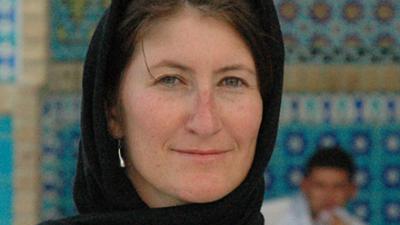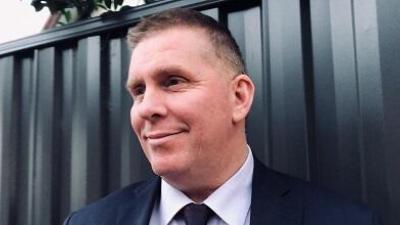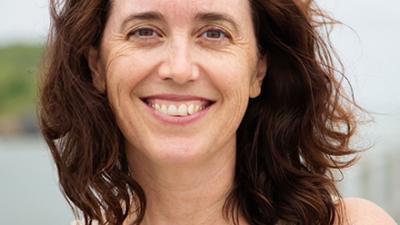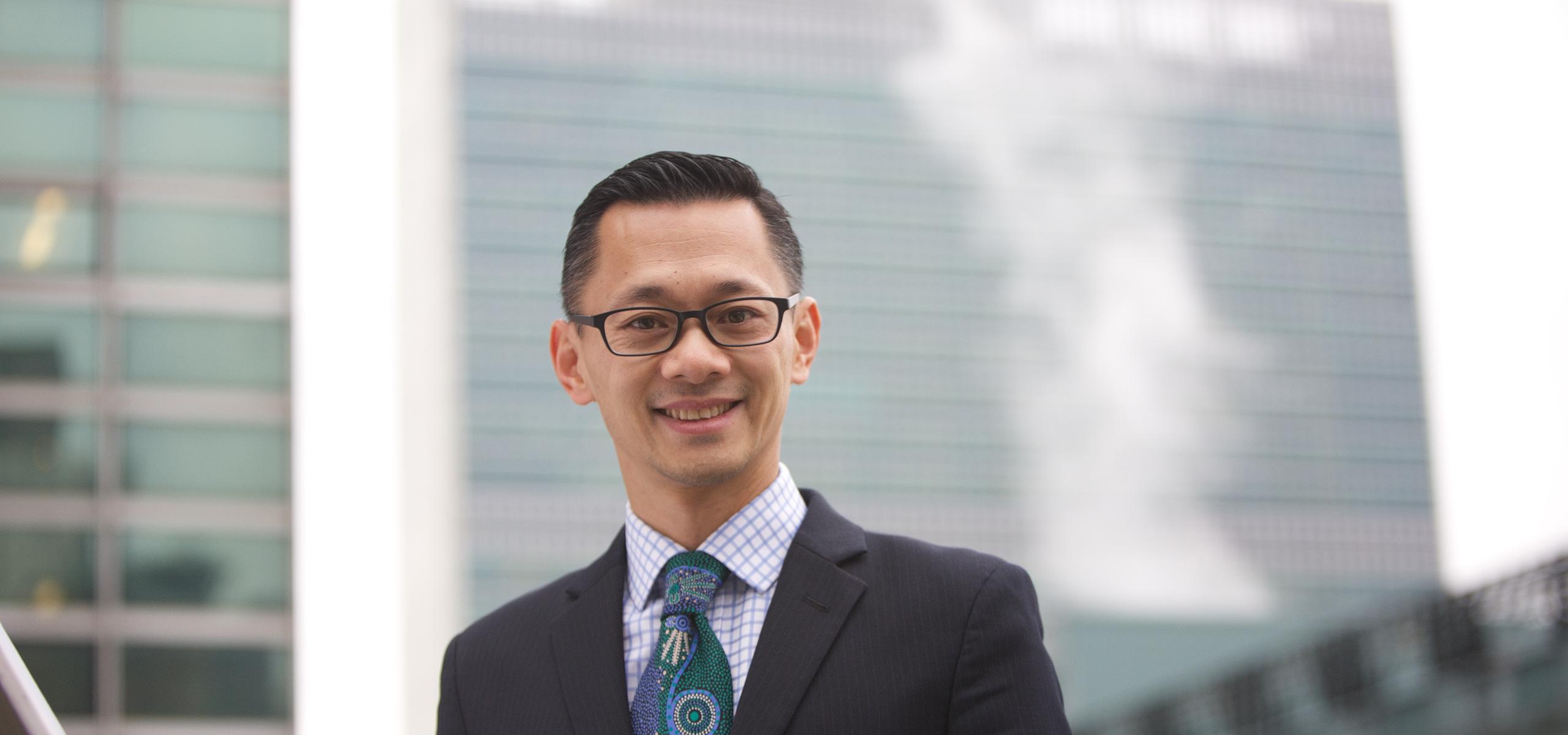
Degree
GDLP '15, LLM '17
Years at ANU
2014 to 2017
Kevin Chang’s (GDLP '15, LLM '17) initial choice for his undergraduate degree at university did not really reflect his personal interests and his idea of what he wanted for his future at the time. It wasn’t until a soul-searching backpacking trip across North America and Europe where Kevin gained valuable perspective and started a career that would impact lives across the globe.
Since then, Kevin has spent the majority of his career working as an international lawyer focusing on human rights issues. It’s a career that has taken him to various countries – including places such as Nepal, Ethiopia, and Myanmar, working on political and armed conflict.
In this Q&A, Kevin shares some of his insights and reflections on his life and how his childhood and family background played a part in his future. Kevin also touches on his experiences at ANU, his professional career, and his other love and passion, tennis, which he claims gave him the most pressure-packed experience of his professional career.
1. Can you tell us a bit about yourself, including your current role and what inspires you?
I’m an Australian lawyer and for the past two decades, I’ve worked as a legal, human rights and conflict advisor in 11 countries, most of the time with the United Nations (UN) but also for the International Committee of the Red Cross (ICRC) and the Australian Government. I’m currently based in Geneva and work as a legal and human rights consultant to various organisations. During the pandemic, there are few opportunities to work internationally, so I’m currently in a holding pattern, seeking the next suitable opportunity. I am also an Associate Professor at National Chengchi University in Taiwan and an Honorary Associate at the University of Sydney.
I was born in Taiwan and moved to Melbourne in 1986 when my father accepted a job with the ABC. I was 11 at the time, and as my parents decided to stay in Australia, Melbourne became my home and the place I grew up. The political and social zeitgeist in the late '80s and early '90s were influential during my formative years. Australia was a welcoming country that was multicultural, socially progressive, and increasingly orienting toward Asia.
My initial choices at university were not based on any idea of what I wanted to be. Even though I was more interested in the humanities, I pursued a BSc degree in physics at Monash University because it was easier to manage a science degree with my inferior English at the time. Then came a few ‘lost’ years when I tried to figure out my path forward. I took some time off and backpacked through North America and Europe, which gave me a better perspective of the world and Australia’s place in it.
As my interest in international politics and human rights started to crystallise in my early 20s, English was also no longer an obstacle. From a basement in Sydney, I applied for an internship at the UN Headquarters in New York, not expecting to be accepted. That experience, coming just months after the 9-11 attacks, proved to be pivotal in my career. I got a taste of an organisation I could imagine working for – one that was international by design, and one that promised the loftiest human ideals.
That was 2002. After the internship, I returned to the University of Sydney to finish an MA in Peace and Conflict Studies. That was followed by one year working on reconciliation issues as an Australian Youth Ambassador in Fiji, then returning to the Australian Government to take up a policy role in indigenous affairs. In 2006 I had a unique opportunity to work for UNHCR in the refugee camps of Pakistan – my first proper UN job. That experience grew into several years of conflict and humanitarian work at the UN that included a role at Geneva Headquarters, a posting in Nepal where I was an advisor to the peace process, and following that, heading the UN peacekeeping mission’s security sector reform programme in Timor-Leste.
2. What motivated you to study your Master of Laws at ANU?
After six years with the UN across four countries, in 2012 I decided to take a break to come back to Australia. My work up to that point had focused on conflict mediation and peacebuilding. As time went on, I realised the need to add more tools to become a more rounded professional. Every aspect of post-conflict work I was involved in – whether it’s demobilising child soldiers, constitution-making, transitional justice or holding elections – was underpinned by justice and the rule of law. Therefore, in addition to some personal factors that pulled me toward a return to Australia, I was eager to further develop my legal training so that I could be a more effective advocate for human rights.
So I returned to the University of Sydney where I completed my JD over three years, followed by two more degrees at ANU – a Graduate Diploma in Legal Practice, followed by the LL.M. The GDLP helped me to qualify for admission as a Legal Practitioner of the Supreme Court of the ACT. I subsequently worked for a year as Senior Legal Advisor, then Acting Director, in the Human Rights Policy Branch of the Federal Attorney-General’s Department.
3. When did international law and human rights emerge as your desired career pathway and specialisation?
I think my family background and childhood experiences all played a part. My parents and grandparents on both sides fled the Chinese civil war from Mainland China to Taiwan in 1949. By today’s standards, they would have been classified as refugees. This war resulted in my father – a seven-year-old child at the time – being separated from my grandfather for the rest of his life. This family history, together with my experience as a young migrant to Australia, has probably been instrumental in instilling a sense of fairness and justice in me. The 1990s was also a special period as many Australians opened our eyes to the historical injustices and disadvantages experienced by our Indigenous peoples.
4. What were some of the most formative experiences from your ANU studies?
The GDLP gave me important practical lawyering skills and the necessary qualification to be admitted as a lawyer. After admission, while working at the Attorney-General’s Department, I completed an LL.M. to consolidate and update my knowledge concerning international human rights and humanitarian laws. ANU had professors who were not only renowned experts in international law, but also respected practitioners in their fields. That was ideal for me as a mid-career professional.
5. Over the past two decades, your career at the UN and ICRC has included postings in various legal, policy and peacekeeping roles in the US, Switzerland, Nepal, Myanmar, Timor-Leste, South Sudan and Pakistan. What have been some of the rewards and challenges of these roles and your experience working at international organisations in general?
I’ve had some very interesting roles over the years, with most of my experience in field locations in countries experiencing armed conflict or political transition. I’ve also had the opportunity to work across different parts of the UN – serving under peacekeeping, development, humanitarian and political mandates – which has given me a deeper appreciation of the functions, the powers and the limits of the organisation.
My time in Nepal (2009-2011) as UNDP’s conflict advisor will always be a highlight considering the timing and the nature of the work, supporting the implementation of the Comprehensive Peace Agreement. In recent years I have worked more as an expert advisor on shorter term deployments. In 2018 I was the first rule of law advisor deployed by the UN to Ethiopia after its remarkable political transition, where I worked to map the country’s legal and justice sector which had been largely closed to the outside world for more than a decade. It has however been disheartening to witness the country sliding back into a civil war during the past year.
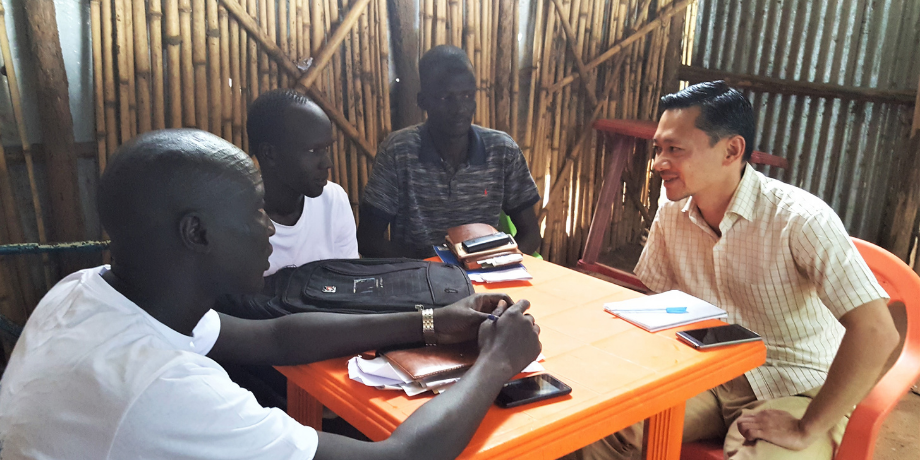
Kevin working with young refugees from South Sudan in the Ethiopian border region of Gambela (July 2018). Image supplied.
During my time in Myanmar (2016-2019) I was glad to have worked as an independent lawyer on submissions to the International Criminal Court advocating for its assertion of cross-border jurisdiction over alleged crimes against the Rohingya people, which was confirmed by the Court’s landmark ruling in September 2018. I also served as UNDP’s Senior Justice Advisor, supporting the strategic planning of the Union Attorney-General’s Office including an assessment of their major reforms in criminal procedure. The military coup of February 2021 however shocked everybody, and I hope Myanmar will return to a democratic path before more suffering takes place.
The examples of Ethiopia and Myanmar show that this field of work is never a linear progression, because countries can take steps back before moving forward again. It means you often can’t see the impact you make until years, or decades, down the track. Through my lecturing, and opportunities like this, I get the chance to share my reflections. One general challenge relates to the limitations of international organisations when it comes to human rights violations. Despite our hopes that international human rights law would be universally applied into the dark corners of every state, the brutal reality is that sovereignty has proven to be the enduring characteristic in international relations, which shields states from responsibility. That’s why in my experience the most impactful work on human rights is often achieved domestically rather than through an international mechanism.
6. In Australia, a common thread of your work with the Government and AHRC has been a commitment to human rights, especially advancing anti-discrimination efforts and advocating for better outcomes for Indigenous Australians. How do you reflect on these roles and, given your international experience, Australia’s own commitment to human rights?
I’ve had several interesting roles domestically in Australia at different stages of my career: as an advisor on Indigenous affairs, as an investigator at the Australian Human Rights Commission, and more recently as a senior legal advisor in the Federal Attorney-General’s Department. We have a challenging environment in Australia because there are very few rights protected under our Constitution, and we have no federal statute that gives full effect to our international human rights obligations. So rather than having legal obligations that bind the government, human rights in Australia often rest on a policy decision or a voluntary undertaking. For example, the right for refugees not to be arbitrarily detained pretty much rests on government policy and ministerial discretion, not the power of our laws.
Even though we consider ourselves an advanced democracy, our politics and institutions don’t reflect that when it comes to human rights. We lack laws and effective independent institutions that limit the government’s powers. Our political culture in the past two decades has also undermined human rights – with major political parties in agreement believing that elections are always won on tough border policies. This is also where our geographic isolation can result in more extremist views – it’s hard to imagine Australian politicians being so indifferent on human rights if we shared borders with other countries. A different geographical situation, like here in Europe, demands a more moderate, cooperative and principled approach to these matters.
7. Asian-Australian leadership is another area in which you’re a passionate advocate. What has been your experience with the ‘bamboo ceiling’ and how can Asian-Australians achieve better representation in leadership positions?
The bamboo ceiling refers to processes and barriers faced by Australians from Asian background in the professional arena, such as racism, discrimination, prejudice and stereotypes that serve to exclude them from leadership roles. Although Asian-Australians make up almost 15 per cent of our population, and consistently out-perform other groups in educational achievements, they are rarely promoted into senior roles in the public sector, in private sector or in government.
I’m pleased that there has been more attention drawn to this situation in recent times. The Asian-Australian Leadership Summit is a key initiative that spotlights the exclusion of Asian-Australians and promotes their achievements. There are different ways we can look at this phenomenon in Australia. It goes without saying that everyone deserves the same opportunity to advance their careers unencumbered by their skin colour or ethnic background. When it comes to the law, we have very good anti-discrimination legislation across all jurisdictions that prohibits racial discrimination in workplaces and public spaces. On the business side, countless studies have concluded that a more diverse workplace makes for better decision-making and higher performance. Indeed, as a society we waste the fruits of our multiculturalism when we fail to utilise our diverse talents.
But despite our ‘fair go’ and meritocratic psyche, the existence of anti-discrimination laws, and a clear business case, we far too regularly choose an Anglo-Celtic default when it comes to leadership. There is now quite a bit of research on the bamboo ceiling, which is caused by a combination of individual, cultural, and organisational factors, underpinned by stereotypes, discrimination and racism. It is also not a uniquely Australian phenomenon.
Having worked in the public sector for two decades, I find the dearth of multicultural leadership particularly damaging to our democracy. When our political and civic leadership does not reflect the diversity of our population, in addition to the lack of representation, it results in deficiencies in policy-making that have a real impact on our communities. Imagine if our social policy, immigration policy, humanitarian policy and foreign policy actually harnessed all of Australia’s talents, life experiences and perspectives? I am certain that would make our governments more relevant, responsive, and closer to the people.
Needing to achieve twice as much to receive half the recognition is a common experience for many Australians. Some people might assume that the blowing winds of our times will inevitably make the next generation of leaders more diverse. But Australia didn’t become multicultural yesterday, so diverse leadership won’t happen automatically if we kick the can down the road and not address the systemic issues.
8. What advice would you give students aspiring to pursue a similar career in international law?
The first thing is that no two careers are alike, because no two people are the same. Each of us carries a unique background and personal characteristics. One approach I’ve always had is to look for roles that are challenging, so that I will have room to grow personally. I also advise students to be flexible and willing to take opportunities that may seem unusual and far from home. Due to Australia’s isolation, we have to travel further and work harder than the rest to put ourselves in the heart of the action.
If international law is your calling, it may be beneficial to spend some time on exchange or working in Europe, because the field of public international law has a European focus (or bias) when it comes to scholarship and recognised institutions. Finally, Australians, by and large, don’t do as well in terms of language ability compared to other countries. An early investment in French, Spanish or Arabic may take you much further than an additional degree.
9. Finally, you previously served the International Tennis Federation as a grand slam official. Can you share how this opportunity arose and, on a lighter note, did this experience lay a solid foundation for international peacekeeping, rule of law and conflict resolution?
I loved tennis while growing up in Melbourne – as a player and a fan. When I was 16 I saw an advertisement to be trained to work at the Australian Open as a line umpire. I signed up and within three months officiated in my first Australian Open, going all the way to the fourth round. Over the next seven years I would work part-time in small tournaments during the year to qualify for the Australian Open each January. This involved mainly working as a chair umpire in semi-professional tournaments, often braving the cold for hours sitting on a metal chair, calling all lines by yourself. Other than the Australian Open, I also got to work in ATP/WTA tournaments in Sydney and Singapore. I was fortunate to have officiated a whole generation of stars including Sampras, Agassi, Becker, Graf and Seles. My personal highlight was officiating in the 1996 Australian Open Women’s Final between Monica Seles and Anke Huber. It fell on my 21st birthday, but curiously, I was assigned on that day to be a net cord judge after calling lines for two weeks. Of course, those roles don’t exist anymore!
I cannot yet draw a direct link between tennis umpiring and my subsequent international conflict and human rights work. Tennis umpiring however remains the longest job I’ve held, and there is no pressure experience like working in a Grand Slam final in front of 15,000 fans. I would love an opportunity to work in sports law one day, which will bring together many of my passions past and present.
